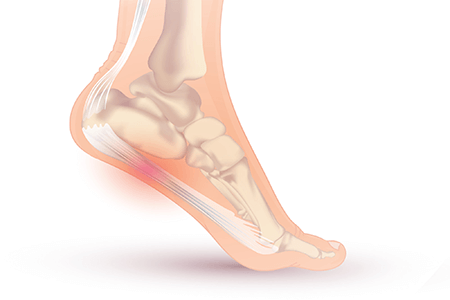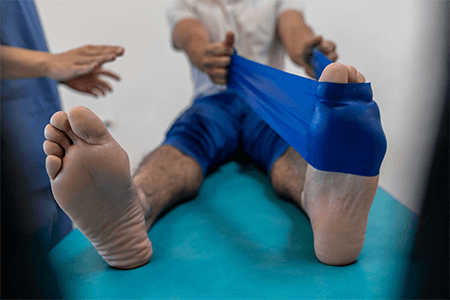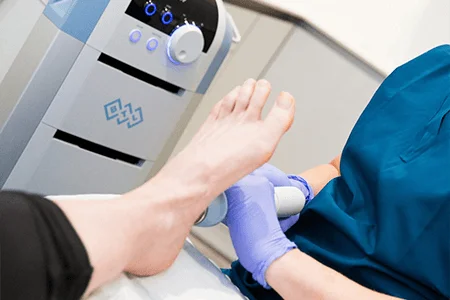Cheshire Foot Clinic
Expert Treatment for Plantar Fasciitis
If you’re dealing with persistent pain in your heel, the plantar fasciitis specialists at Cheshire Foot Clinic can help. Many runners and health enthusiasts know foot pain can be a major challenge, especially when discomfort concentrates in the heel. Among the most common culprits is plantar fasciitis. This ailment can impact your daily life and hamper your fitness goals. Cheshire residents with heel pain, plantar foot pain, or other related symptoms shouldn’t hesitate to call our expert podiatrists. We’ll help you understand the condition, explain available treatment options, and ensure you can prevent future recurrences.

What is Plantar Fasciitis?
Plantar fasciitis is inflammation of the plantar fascia, a thick band of tissue running along the bottom of your foot that connects your heel bone to your toes. The condition often results from excessive strain or repeated stress on the plantar fascia. These issues can cause small tears that lead to pain and stiffness. Plantar fasciitis can develop in anyone. Left untreated, it can interfere with your mobility and overall quality of life.

Symptoms of Plantar Fasciitis
The most common symptom of plantar fasciitis is pain in the heel or foot, particularly upon awakening or after periods of inactivity. The pain may be sharp or stabbing and often decreases as you move around. However, it may return after prolonged standing, walking, or exercise. If this seems familiar, you should seek help from the plantar fasciitis specialists at Cheshire Foot Clinic. Other symptoms indicating plantar fasciitis include:
• Stiffness in the arch or sole of your foot
• Swelling in the heel area
• Tenderness along the bottom of your foot
• Pain that worsens after intense activity

Plantar Fasciitis Treatment Options
Relief from plantar fasciitis is possible with the right combination of treatments. Our specialists offer a range of evidence-based options, such as:
• Stretching and Strengthening Exercises – Customised stretches can reduce plantar fascia tension and improve flexibility in your calves and feet.
• Custom Orthotics – Specially designed insoles support your feet and redistribute pressure to alleviate plantar pain.
• Shockwave Therapy – This non-invasive treatment stimulates the healing process to reduce inflammation.
• Laser Therapy – We can use a therapeutic laser to direct light energy into damaged tissue to reduce inflammation and accelerate the body’s healing process.
• Strapping/Support Hosiery – We can teach you specialist strapping techniques and supply socks to support you during activity.
• Mobilisation/Manipulation – These manual therapies are used in combination with strengthening exercises and orthotics to target stiff tissues and improve foot function.
• Ultrasound-Guided Corticosteroid Injection – If necessary Corticosteroids can be used to reduce inflammation and swelling to relieve pain.

How to Minimise Plantar Fasciitis Recurrences
With lifestyle changes, you can lower your risk of developing plantar fasciitis again. Avoid recurring plantar fasciitis bouts with these preventive measures:
• Wear shoes with proper support and cushioning
• Replace old, worn-out running shoes regularly
• Incorporate calf and foot stretches into your routine
• Gradually increase the intensity of your workouts to avoid overuse injuries
• Maintain a healthy weight to reduce stress on your feet.

Plantar Fasciitis Causes
There are both external and internal causes that may lead to plantar fasciitis. Among those that may contribute to the condition’s development are:
- Overuse and Repetitive Movements – High-impact activities like running, jumping, or long-distance walking can put excess stress on the plantar fascia.
- Improper Footwear – Wearing shoes with insufficient arch support or cushioning can lead to plantar foot pain over time.
- Tight Calf Muscles – Tightness in the calf muscles can strain the plantar fascia and increase your risk of developing the condition.
- Excess Weight – Carrying extra weight places additional pressure on your feet and can aggravate the plantar fascia.
- Ageing – Plantar fasciitis is more common in middle-aged individuals as the plantar fascia naturally loses elasticity over the years.

We Can Diagnose Plantar Fasciitis
The first step in finding relief from plantar fasciitis is a proper diagnosis. There are over 30 causes of heel pain, not just plantar fasciitis! Cheshire Foot Clinic’s thorough diagnostic process ensures we can get to the root of your heel pain and develop a tailored treatment plan to address your needs. Our specialists will:
- Review your medical history to identify possible risk factors or underlying conditions
- Conduct a physical exam to evaluate pain areas and check for tenderness, swelling, or stiffness in your foot
- Use imaging tests like X-rays or ultrasounds if necessary to rule out other heel pain causes, such as bone spurs or fractures
Contact Us Today for Plantar Fasciitis Treatment
Cheshire Foot Clinic is dedicated to helping anyone with plantar fasciitis regain their mobility and comfort. Whether you’re struggling with heel pain or seeking proactive ways to prevent plantar fasciitis, our podiatrists can help. Book an Appointment or call 01565 655840 or email to schedule a consultation.
Download a copy of our leaflet for more information:
Shockwave Therapy for Plantar Fasciitis